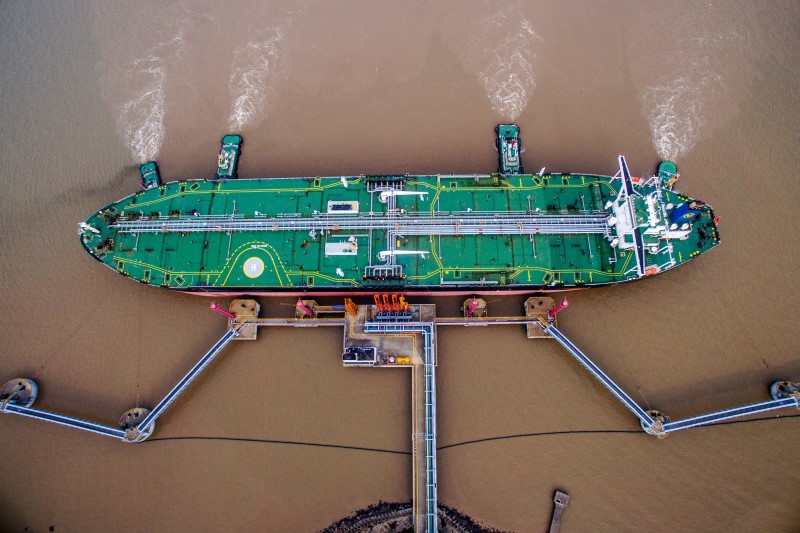By Brian Ellsworth and Marianna Parraga
CARACAS/MEXICO CITY (Reuters) - The United States on Tuesday sanctioned a network of oil trading firms, individuals and vessels that have helped Venezuelan state-run oil company PDVSA sell crude mainly to Asia despite Washington's sanctions on the South American nation.
The measure targets a network that the U.S. Treasury Department says helped the administration of President Nicolas Maduro, whose 2018 re-election Washington called a sham, broker the sale of hundreds of millions of dollars in Venezuelan oil.
"Those facilitating the illegitimate Maduro regime's attempts to circumvent United States sanctions contribute to the corruption that consumes Venezuela," Treasury Secretary Steven Mnuchin said in a news release.
The Treasury said its Office of Foreign Assets Control, or OFAC, targeted three individuals, 14 entities and six vessels for their ties to a network attempting to evade U.S. sanctions on Venezuela's oil sector.
It said the "principal actors" were Alessandro Bazzoni, Francisco D'Agostino and Philipp Apikian, as well as oil trading firms including Elemento Ltd and Swissoil Trading SA.
Washington first imposed sanctions on PDVSA limiting its oil sales in early 2019, which cut off its main destination for exports, the United States. The measure was followed last year by sanctions on two units of PDVSA's main trading partner, Russia's Rosneft, as well as shipping sanctions blacklisting tankers involved in the transportation.
The U.S. FBI started probing Elemento and Swissoil last year, along with Mexico-based Libre Abordo and Schlager Business Group, aiming to gather information for Treasury's inquiry into possible sanctions-busting. Libre Abordo, Schlager and Mexican citizens Joaquin Leal Jimenez, Olga Maria Zepeda and Veronica Esparza, were sanctioned in June.
Venezuela's information and oil ministries, PDVSA, Libre Abordo, Schlager and Elemento did not immediately reply to requests for comment. Reuters could not immediately reach Swissoil, Bazzoni, Apikian, D'Agostino, Leal, Zepeda or Esparza.
Tuesday's move expands on the sanctions on the Mexico-based individuals and businesses for "operating a sanctions-evasion scheme benefiting the illegitimate Maduro regime and PDVSA."
"Today's action targets additional orchestrators and facilitators with ties to the Mexico network who have conspired with Maduro's oil minister, Tareck El Aissami Maddah, and indicted money launderer Alex Nain Saab Moran to broker the sale of hundreds of millions of dollars of Venezuelan oil," the Treasury said.
El Aissami and Saab are also under U.S. sanctions. Saab was arrested last year in Cape Verde.
The United States accuses Bazzoni and D'Agostino of being "core facilitators" of the network, connecting Swissoil, led by Apikian, and Elemento with PDVSA and Saab.
"Following Saab's June 2020 arrest in Cape Verde and OFAC's designation of Leal, Bazzoni took over the core coordinating role in the ongoing scheme to broker the re-sale of Venezuelan-origin crude oil from PDVSA and charter vessels willing to go to Venezuela to load oil," the Treasury added.
The OFAC is also this time blacklisting Ukraine-based Fides Ship Management and its tanker fleet including vessels Baliar, Balita, Domani and Freedom, as well as tankers Maximo Gorki, owned by Venezuela's water authority INEA, and Sierra, owned by Russian firm Rustanker.
The blacklisted vessels have transported Venezuelan crude since sanctions were imposed on PDVSA in 2019, according to company data and Refinitiv Eikon vessel tracking data.
INEA did not immediately reply to a request for comment. Reuters could not immediately reach Fides Ship Management or Rustanker.
